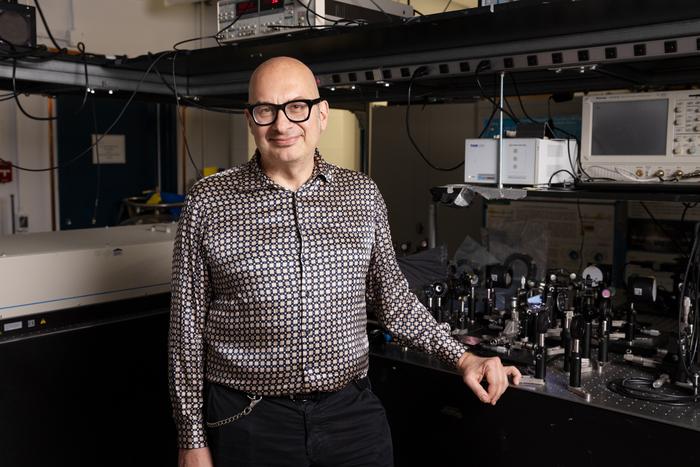
Professor Roberto Morandotti, a highly esteemed figure in the realm of quantum optics and photonics, has been honored with the 2025 IEEE Photonics Society Quantum Electronics Award, marking a groundbreaking recognition for the Institut national de la recherche scientifique (INRS) in Quebec, Canada. This accolade, bestowed by the Institute of Electrical and Electronics Engineers (IEEE), celebrates Professor Morandotti’s pioneering contributions to the generation of entangled photons and the sophisticated manipulation of complex quantum states within cutting-edge photonic devices and systems. His work not only advances the frontiers of fundamental science but also paves the way for practical quantum technologies set to revolutionize secure communication and information processing.
Morandotti’s research career, distinguished by an impressive publication record exceeding 350 peer-reviewed articles, embodies a deep commitment to pushing the limits of quantum photonics. His efforts have been pivotal in overcoming long-standing technical barriers, such as the inherent instability of photon-based quantum signals and the integration challenges posed by complex optical architectures. By innovating miniaturized photonic platforms compatible with existing telecommunications infrastructures, he has unlocked new possibilities for deploying quantum technologies on scales previously considered impractical.
At the core of this achievement is Morandotti’s focus on entanglement generation, a quantum phenomenon where particles such as photons become intrinsically linked, regardless of distance, enabling phenomena impossible under classical physics. This property holds enormous promise for quantum communication, particularly in the realm of quantum key distribution (QKD), which facilitates ultra-secure information exchange immune to eavesdropping. Morandotti’s advancements in creating stable, high-quality entangled photons using integrated photonic circuits represent a crucial step toward real-world quantum networks capable of safeguarding sensitive data at unprecedented speeds.
.adsslot_SdjOxUevZR{ width:728px !important; height:90px !important; }
@media (max-width:1199px) { .adsslot_SdjOxUevZR{ width:468px !important; height:60px !important; } }
@media (max-width:767px) { .adsslot_SdjOxUevZR{ width:320px !important; height:50px !important; } }
ADVERTISEMENT
The 2025 IEEE Photonics Society Quantum Electronics Award also recognizes his leadership as the scientific head of the Ultrahigh Speed Light Manipulation Laboratory and his tenure as the Canada Research Chair in Smart Photonics. Through these roles, Morandotti has spearheaded initiatives that combine non-linear optics with quantum engineering, nurturing innovations that blend fundamental physics with scalable technological applications. His work enables complex quantum states to be precisely controlled and processed, setting the foundation for advanced quantum simulation, enhanced metrology techniques, and the integration of photonics into artificial intelligence frameworks.
This prestigious award will be formally presented during the IEEE Photonics Conference in Singapore, underscoring the global significance of Morandotti’s research. His pioneering efforts are not only acknowledged among the quantum optics community but have also garnered international media attention, testament to the broad implications of his work beyond academia. Notably, his technologies contribute to bridging the gap between laboratory prototypes and commercial quantum networks, a critical threshold for the widespread adoption of quantum information science.
Morandotti’s academic journey, which began with a Master’s degree from the University of Genova and a Ph.D. from the University of Glasgow, followed by postdoctoral research at premier institutions such as the Weizmann Institute of Science and the University of Toronto, has equipped him with a unique blend of theoretical knowledge and practical expertise. Since joining INRS in 2003, he has cultivated a research environment conducive to multidisciplinary exploration, promoting cross-pollination between physics, engineering, and computer science to tackle the nuances of quantum photonic systems.
His prolific contributions include numerous patents and the co-founding of Ki3 Photonics, a spin-off company that translates quantum photonic research into commercial solutions designed for straightforward integration with existing fiber-optic communication infrastructure. This entrepreneurship exemplifies the tangible impact of his research, moving quantum technologies from theoretical constructs to deployable systems capable of transforming telecommunications security paradigms worldwide.
Beyond his scientific output, Professor Morandotti has demonstrated exceptional mentorship, guiding more than 200 students and postdoctoral fellows. Many of his protégés have secured prestigious academic and research positions globally, including Canada Research Chairs and European Research Council grantees. His mentorship has been recognized by the Canadian Association of Graduate Studies, reflecting his commitment to nurturing the next generation of quantum scientists and engineers.
The significance of Morandotti’s research lies in its visionary approach to quantum photonics, a pivotal technology for future information systems. By tackling the challenges of photonic integration, stability, and scalability, his work facilitates the transition from experimental setups to robust, high-performance quantum devices capable of tackling complex computational problems, enhancing sensor precision, and enabling secure global communication networks.
In addition to technical innovation, Morandotti’s research addresses the broader system-level integration required for practical quantum technological deployment. His systems demonstrate compatibility with contemporary telecommunication standards, a strategic alignment that dramatically reduces the barriers for quantum devices’ market entry. This approach embodies a pragmatic vision that balances groundbreaking science with realistic engineering constraints.
The progress achieved under his leadership foreshadows a future where quantum networks become ubiquitous, supporting applications ranging from confidential communication to distributed quantum computing. By developing photonic technologies that exploit entanglement and complex quantum state processing within chip-scale platforms, Morandotti’s work also catalyzes advancements in quantum simulation methods and novel algorithms capable of addressing unsolvable problems by classical computers.
INRS, where Professor Morandotti directs much of his groundbreaking research, stands at the forefront of graduate-level scientific training and innovation in Quebec. The institute emphasizes strategic sectors such as energy, telecommunications, environment, and health sciences, aligning with Morandotti’s contributions to quantum photonics. His award offers a testament to the institution’s status as a hub of high-impact scientific endeavor and a catalyst for technological breakthroughs with global reach.
In conclusion, Roberto Morandotti’s receipt of the IEEE Photonics Society Quantum Electronics Award is a landmark event spotlighting the convergence of quantum optics and photonics toward transformative, real-world technologies. His visionary research, combining theoretical insights and practical implementation, not only expands the horizons of quantum science but also accelerates the integration of quantum devices into everyday telecommunications infrastructure. As the era of quantum technologies dawns, Morandotti’s leadership and innovations will undoubtedly remain central to inspiring and shaping the future of secure, scalable quantum information systems worldwide.
Subject of Research: Quantum Photonics, Entanglement Generation, Integrated Photonic Quantum Devices, Quantum Communication Technologies
Article Title: Professor Roberto Morandotti Honored with IEEE Photonics Society Quantum Electronics Award for Groundbreaking Advances in Quantum Photonics
News Publication Date: June 27, 2025
Web References:
Roberto Morandotti at INRS
IEEE Photonics Society Quantum Electronics Award
INRS
IEEE Photonics Society
Image Credits: Josée Lecompte
Keywords
Quantum Photonics, Entangled Photons, Integrated Photonic Circuits, Quantum Communication, Nonlinear Optics, Quantum Networks, Quantum Key Distribution, Quantum Simulation, Photonic Devices, Telecommunication Integration, Quantum Metrology, Smart Photonics, Professor Roberto Morandotti
Tags: entangled photon generationIEEE Photonics Society Quantum Electronics Awardinformation processing breakthroughsINRS Quebec contributionsminiaturized photonic platformsphotonic devices and systemspractical quantum technologiesquantum optics advancementsquantum state manipulationRoberto Morandottisecure communication innovationstelecommunications integration challenges


